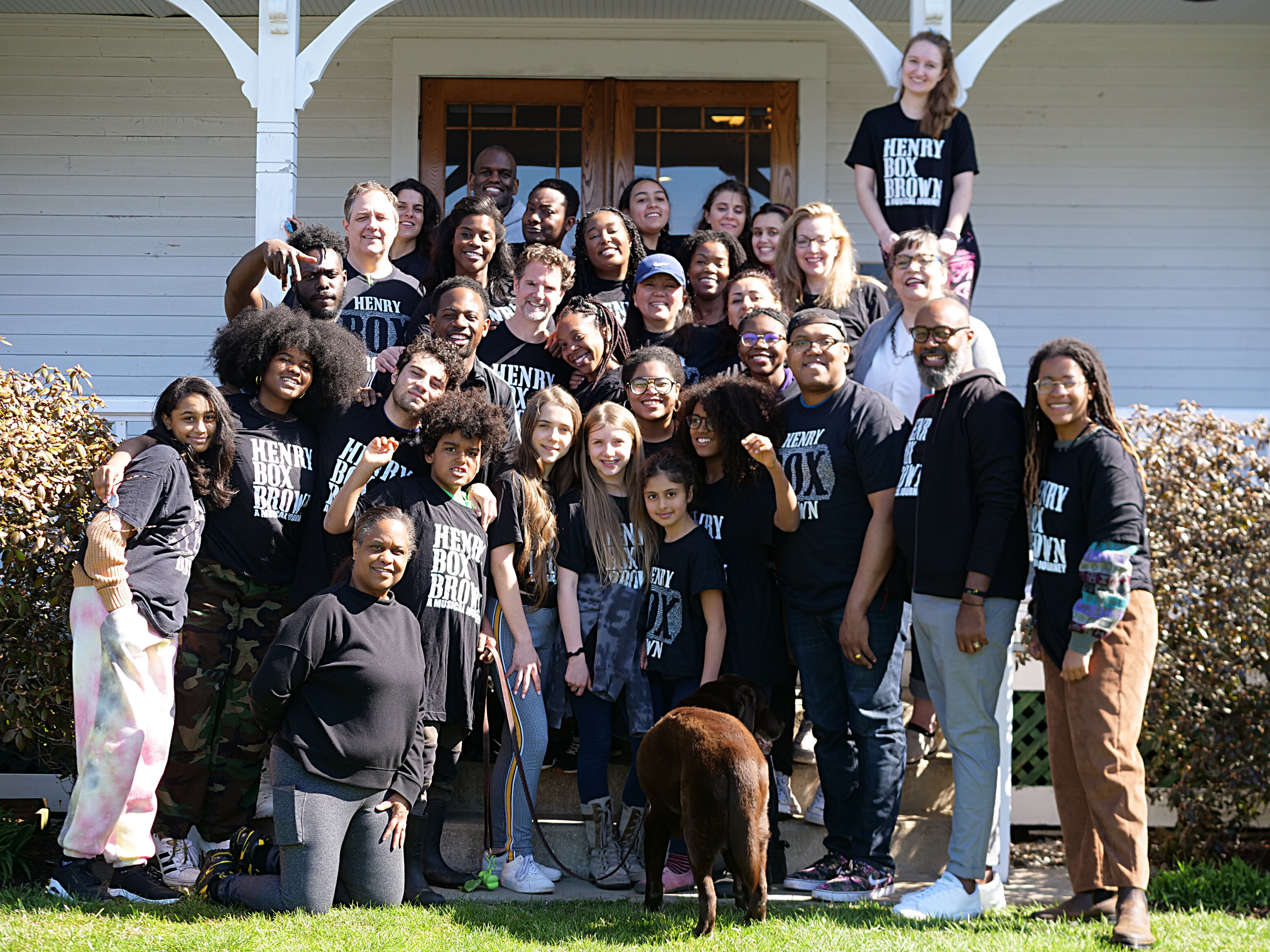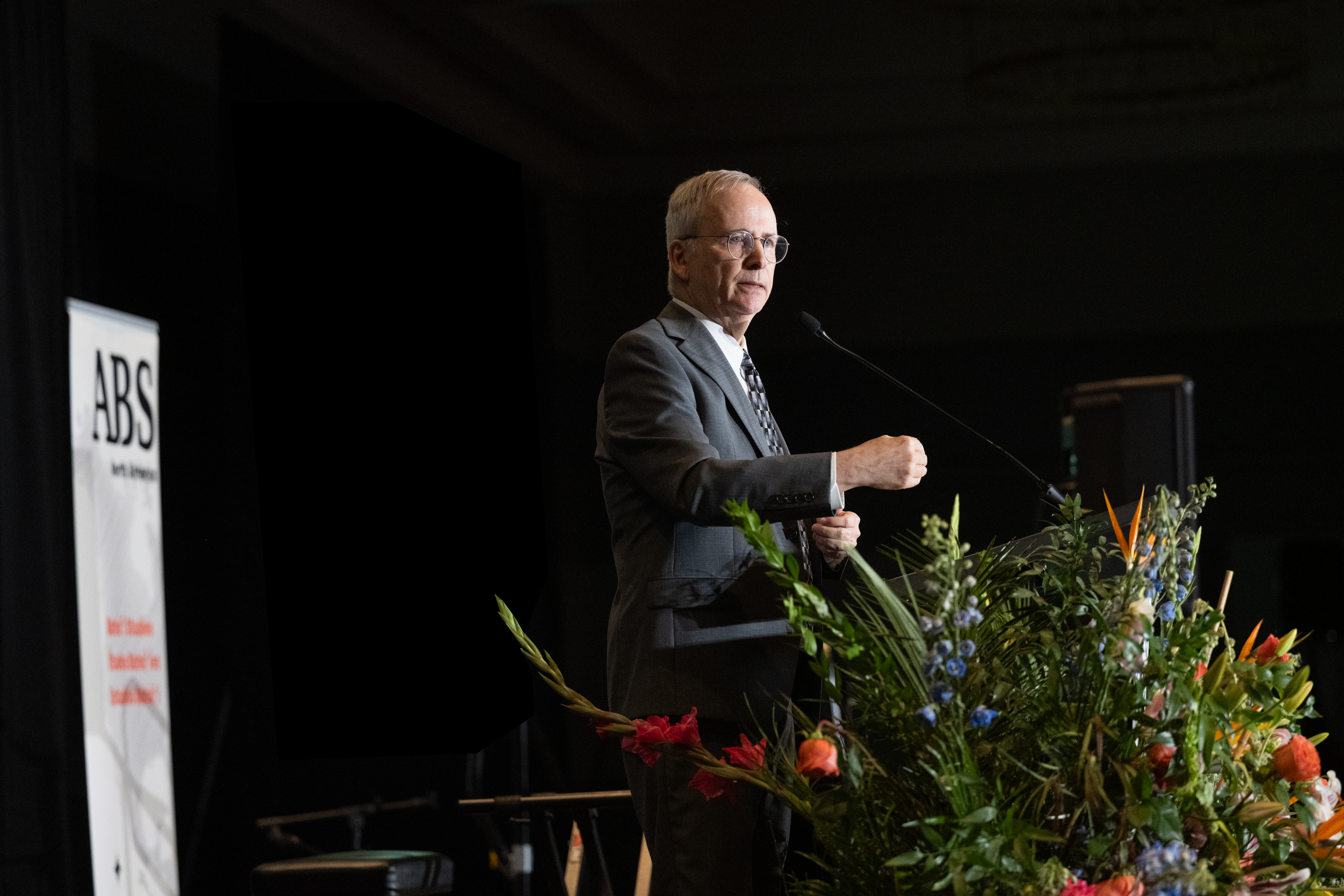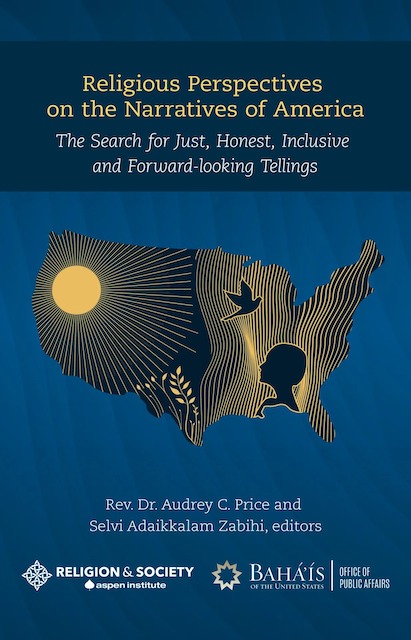
What Baha’is are learning from interfaith involvement in Cincinnati
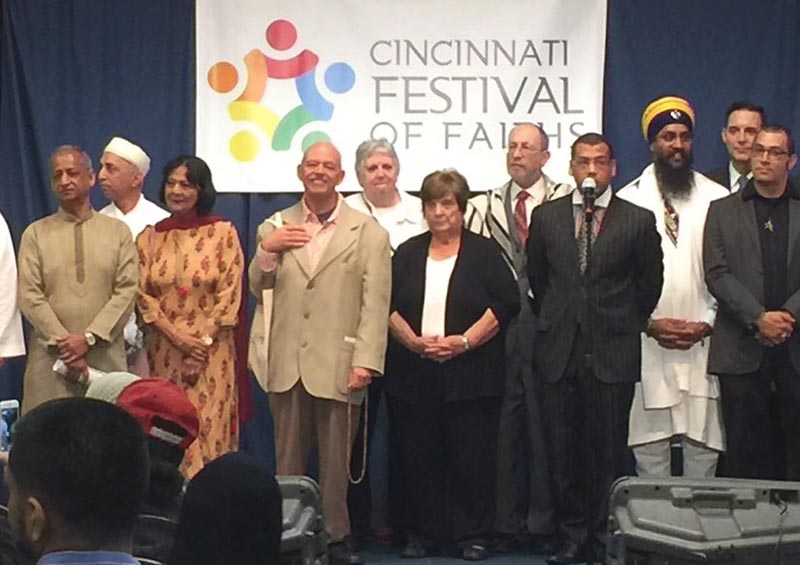
In the four years since Baha’is Deb and Steve Vance moved to Cincinnati, Ohio, they and other area Baha’is have found one opportunity after another for interfaith understanding and cooperation. Some of these were undertaken as individuals and in other cases they sought sponsorship and support from the Cincinnati Spiritual Assembly, local governing body of the Baha’i Faith.
Deb Vance recently reflected on 10 themes that have emerged from that involvement. In her words:
Dive into the community
After settling into our new home, we sought ways to become engaged in the community, beginning by signing up with Nextdoor Clifton, an online site specific to our neighborhood.
Responding to an announcement there, we became involved in a round-robin interfaith discussion/dinner group called Sacred Table, begun by an imam whose congregants feared rising anti-Islam tensions and threats of violence and sought support from neighboring congregations.
Another example is that when I saw that the Clifton Community Cultural Center was holding an interfaith panel discussion, I offered to come to speak as a Baha’i and was warmly included along with a rabbi, a priest and a minister. The imam was also scheduled but was unable to appear.
Embrace an attitude of learning
Sacred Table’s goal was to create bonds of friendship and build community among people of faith. One Sunday afternoon each month we’d meet over a potluck dinner either at the mosque or a neighborhood church and have tabletop conversations modeled around a word or idea, with some prompts to get us thinking.
The conversation rules are to tell a brief story with a beginning, middle and end related to the topic. It works best in small groups. We were asked not to sit with people we knew and to speak from our own personal beliefs and not proselytize or represent our faith.
Soon, the imam suggested that since my husband and I attended every month, we might be willing to be table facilitators. At our first training session we learned more about the conversation model used by Sacred Table, which was a technique developed by a local group that trains various organizations how to overcome their differences.
Find common experiences
One Sacred Table topic was to talk about memories of traditional food used in our different congregations.
I explained how Baha’i communities vary across cultures so there’s no standard food, but added that one thing Baha’is have in common with other congregations is that it’s generally women who prepare and bring food to community meals. It turned out this was something the attendees, all women, could relate to. A lively conversation followed where we really got to know each other.
Involve others
We’d begun attending Sacred Table as individuals but spread the word to Baha’is in our community and others in the vicinity. During a two-year period, an average of six Baha’is attended each month, with a total pool of 12 Baha’is who joined occasionally.
Everyone reported meeting people who had never heard of the Baha’i Faith or, if they had, knew little or nothing about it. The Baha’is were happy to answer questions while also learning about others’ faiths and making new friends. Through these connections, more opportunities for engagement opened and Baha’is started to become better known throughout the area.
See without prejudice
A Cincinnati interfaith group was formed after 9/11 to encourage dialogue among Muslims and Jews. Later, when Christians joined in, it took on the name Bridges of Faith Trialogue. In 2018, the group decided to include every faith they could think of as they organized the city’s first Festival of Faiths that June.
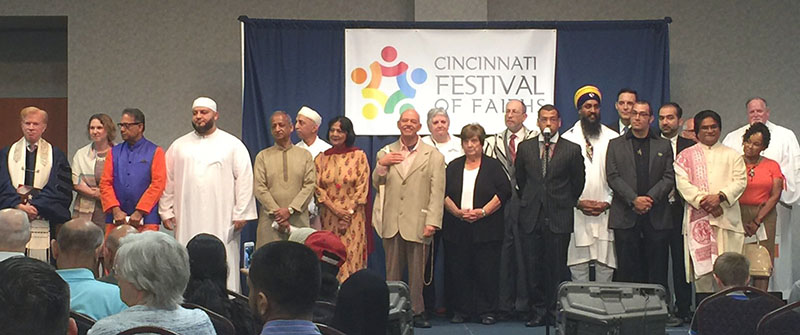
The Cincinnati Spiritual Assembly was invited to send a representative to serve on the steering committee for the event. After checking with Baha’is in Louisville and Indianapolis who had participated in a Festival of Faith in their cities, the Assembly decided to do so.
Since we’re retirees with flexible schedules, I volunteered to be the representative. The 30-some steering committee members comprised rabbis, pastors, priests and directors of nonprofits. I was impressed by their sincerity, openness, professionalism and harmony. In short, the feeling of spirit has been palpable in this group.
The steering committee process itself is fascinating. Just as in the Festival, we all avow feeling the presence of the Holy Spirit at our meetings. A Protestant member says he “needs” to have monthly meetings for the spiritual enrichment he gets from our gathering together. A Catholic member says he thinks our working together is even more important than the outcomes.
Create bonds of friendship
I served on a Festival subcommittee along with a Catholic who was one of the founders of Trialogue, a Muslim woman, and a Jewish woman who is director of the Holocaust Museum to create a discussion groups during the Festival. Through our monthly meetings at a café, we became friends.
At Sacred Table, after everyone has shared a story, each person in the group shares a “gift” with the storyteller i.e., about what they appreciated about their stories. These gifts are often spiritual attributes that are evident in the story: courage, love, bravery, detachment and so on. Again, it’s a way not just to elevate the conversation but also to solidify bonds of friendship.
You never know where opportunities will lead
A Baha’i shared my name with a Lebanese Maronite Christian who was working on a series of newspaper articles about people of faith who were in some way involved in social action. He interviewed me about some of my experiences from the past and a multi-page article was published in Street Vibes, the local weekly newspaper supporting the homeless.
People we met at Sacred Table widely shared the name of the Baha’i Faith. Those new connections have resulted in invitations from many organizations, including Humans of Cincinnati; an area-wide committee looking for ways to inaugurate an interfaith youth group; Earth Connections; Unity Church; a community garden; an interfaith book group; a yoga school; the American Jewish Committee; the Ohio chapter of Interfaith Power & Light; Sisters of Charity; Women in Northern Cincinnati Suburbs (WINCS); and the Episcopal diocese of Southwest Ohio.
Take chances
A member of WINCS was on the Festival of Faiths Steering Committee and we recognized each other from her visit to the Cincinnati Baha’i Center. One day I heard her discussing an event WINCS had planned asking Abrahamic religions to talk about their faith groups’ views of Mary, mother of Jesus.
I asserted that the Baha’i Faith should be considered Abrahamic, so they invited me to join the panel discussion which was held at the Islamic Center in West Chester. I used passages from the Kitab-i-Iqan where Baha’u’llah, prophet-founder of the Baha’i Faith, quotes the Qur’an.
Two years later, Steve and I were among 200 people of many religions invited to the Islamic Center for an annual interfaith dinner. When the imam spoke he stressed spiritual truths all religions share and that we’re all from the same God.
Give and accept support
During fall 2018 there were several violent attacks against people of faith around the world. Vigils were held in Cincinnati for each. Baha’is were among those showing support, and our presence was noticed and appreciated.
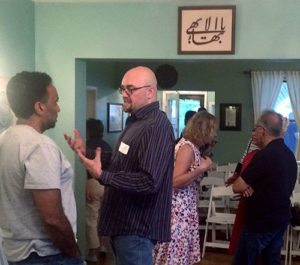
In January 2019 we reconvened to prepare for a new Festival of Faiths using a theme becoming popular among churches: creating the “beloved community” mentioned in several of the Rev. Martin Luther King Jr.’s writings.
We also launched Sacred Connections, a project where each month we visited different congregations. Several area Baha’is make a point of attending every single one. During these visits, people ask us about our Faith so we have opportunities to share information and affirm our common spiritual teachings. For the Baha’i Sacred Connection, we held a service based on the Nineteen Day Feast, at which Baha’is gather to worship, consult and socialize.
When the Spiritual Assembly learned the Zoroastrian community didn’t have a center of its own for the Sacred Connections, we invited them to use the Baha’i Center for their traditional new-year celebration and an explanation of their religion’s teachings.
We also allowed the youth group Kids4Peace to use the Baha’i Center for its end-of-the-year potluck dinner. Five families and their children attended, as well as four Baha’is who found opportunities to answer questions and talk about the Faith.
Following the success of the first Festival of Faiths, the parent nonprofit Trialogue expanded its mission and invited others to become members, including Buddhists, Sikhs, and Hindus. Steve and I joined as Baha’i members. To kick off its new identity, the group had changed its name to EquaSion, standing for equality, spirituality and inclusion.
Recognize one common faith
Experience and knowledge gained at Sacred Table about how to authentically interact with people of other faiths helped us tailor fireside talks and spiritual conversations to emphasize our spiritual similarities.
We’ve learned that others understand when we affirm that various religions exist, with their special rituals and cultures. In fact, the adherents of many religions enjoy the diversity of approaches to God. But underlying this is the one common faith we all share.
We mutually affirmed, with our new friends in faith, the presence of the Holy Spirit apparent in our fellowship. Our firesides at the Baha’i Center have centered on such topics as finding God, the reality of the soul and divine teachers’ use of metaphors as tools for understanding the world.
Now that the concept of our shared spiritual beliefs has become more widespread, it’s clear that probably the most striking and unique gift of Baha’u’llah’s revelation for this day is the strong covenant and the administrative order.
People are curious how we manage to organize ourselves in the absence of clergy. They want to know such things as who “leads the services” and are struck by our penchant for sitting in a circle and taking turns reading passages from our Writings, whose beauty and power moves them. They’re intrigued by the idea of elected leaders at all levels and by the process of consultation.
What this also means, at least around here, is that we have a great deal of work to do and it all depends on individuals stepping up. In my conversations, I’m very candid about the fewness of our numbers and how our work depends on individuals showing up and doing the work. We’re young and growing and don’t have the professional staff and network of connections that we see especially among Jewish, Christian and Muslim congregations.
We have discovered that the Holy Spirit is the one most powerful way in which God removes feelings of competitiveness, distrust and misunderstanding among the strong believers of all religions. Our interfaith gatherings are like gardens of diversity wherein the flowers of sincere belief can blossom together. Surely, this is what we have all hoped to see in our lifetimes.


